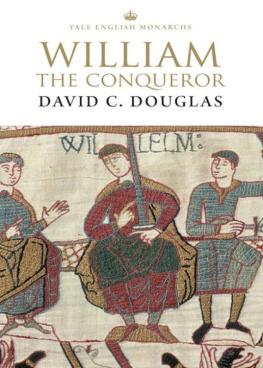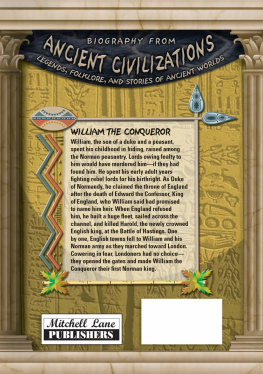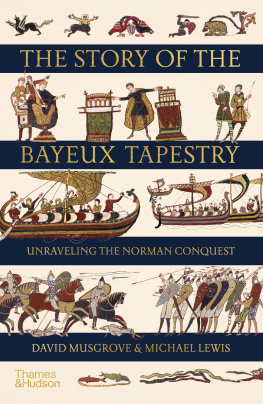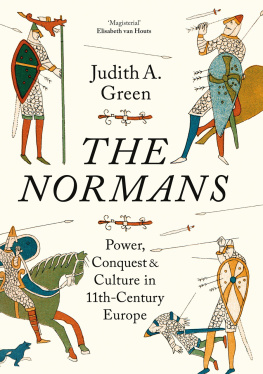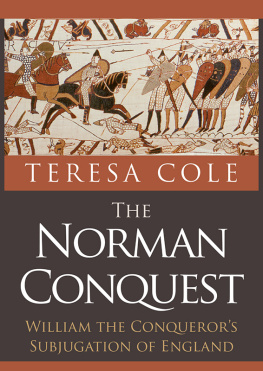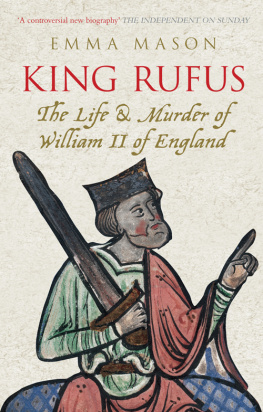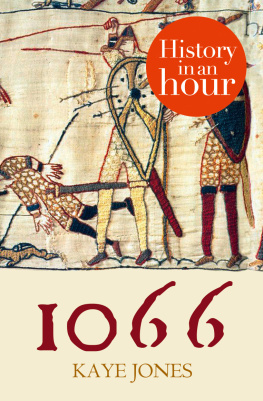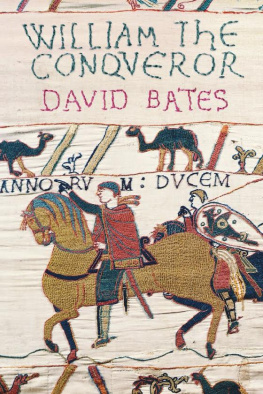

First published in Great Britain in 1964 by Eyre Methuen Ltd
First published in paperback in 1969 by Methuen London Ltd
This edition first published by Yale University Press in 1999
Copyright 1964 David C. Douglas
New edition 1999 The Estate of David C. Douglas
New Foreword 1999 Frank Barlow
All rights reserved. This book may not be reproduced in whole or in part, in any form (beyond that copying permitted by Sections 107 and 108 of the U.S.
Copyright Law and except by reviewers for the public press), without written permission from the publishers.
Printed in Great Britain by Good News Digital Books
Library of Congress Catalog Card Number 99-61176
ISBN 978-0-300-07884-8 (pbk.)
A catalogue record for this book is available from the British Library.
3 5 7 9 10 8 6 4
TO
Evelyn Douglas
CONTENTS
APPENDICES
MAPS
FOREWORD TO THE YALE EDITION
by Frank Barlow
Full of honours, David Douglas died in 1982, eighteen years after this book was first published. Although interest in the Norman conquest of England has increased rather than abated since he wrote, Douglas's William the Conqueror has not been superseded. The conquest has always been regarded as the great turning-point in English history. It was the moment when the kingdom, which had evolved out of the settlement of Germanic peoples in Britain in the fifth century, and when already shaken by the Scandinavian conquest at the beginning of the eleventh century, was given a completely new and lasting direction. In popular history it is a key event; for scholars it is a stopping place, convenient for considering several constitutional, economic and social matters. It has attracted many distinguished historians since the mid-Victorian age. E. A. Freeman published his The History of the Norman Conquest of England in six volumes between 1867 and 1879, while concurrently expanding and revising it. The conquest was investigated by William Stubbs in the first volume of his The Constitutional History of England (1873), and by Sir Frederick Pollock and F. W. Maitland in their History of English Law before Edward I (2 vols., 1895). And in the last years of the century J. H. Round, by attacking the views of Freeman and his disciples in articles and reviews, made the subject highly controversial.
No one has doubted that the Norman conquest was the sole responsibility of William, duke of Normandy: that without his ambition, drive and military talents it would not have taken place. He is, therefore, one of the greats of history. But for a variety of reasons he has not usually been found very attractive. Ordericus Vitalis, the Anglo-Norman monk and historian at Saint-Evroult, who, as a patriotic Englishman, did not care overmuch for the Conqueror, in his Ecclesiastical History referred those of his readers who wished to learn more about him to the judicious account of William of Poitiers, archdeacon of Lisieux, and, more hesitatingly, to the epic of Guy, bishop of Amiens. He could have added William of Jumiges's contribution to The Deeds of the Dukes of the Normans and recommended a look at the Bayeux Tapestry. All these sources are interrelated, with the epic most probably the earliest in date. They did, indeed, provide an account of some parts of William's life and deeds (vita et gesta), but shed little light on his private behaviour (conversatio). There is scarcely an anecdote in the whole corpus. Perhaps revealingly, the most vivid and horrible episode is William's death and burial. And it was left to L. J. Engels to point out in 1973 that the hitherto influential character sketch in De Obitu Willelmi Ducis Normannorum Regisque Anglorum was copied almost verbatim from Einhard's Life of Charlemagne and the Astronomer's Life of Louis the Pious. In Bishop Guy's epic William is just a bloodthirsty warrior, of amazing strength and courage and without pity or remorse, in no way chivalrous. The Anglo-Saxon Chronicle in its obituary notice followed the king's love and patronage of monks and his dignity as king with a strong denunciation of his tyranny and injustice, although allowing that he had kept good order in the kingdom. In contrast, William's two elder sons, Robert, duke of Normandy, and William Rufus, king of England, but not the youngest, King Henry I, inspired much gossip and many good stories. Biographers of the Conqueror are therefore forced to concentrate their attention on the events and their effects on the kingdom, the duchy and their neighbours.
David (Charles) Douglas (18981982), a Scot and keen golfer, studied at Oxford under a number of most distinguished medievalists, J. E. A. Jolliffe, E. A. Lowe, Reginald Lane Poole and the legendary Vinogradoff a pupil of Mommsen and a sometime professor in Moscow University. And, after a foray into the East-Anglian social scene, inspired by Vinogradoff, he settled down almost exclusively to a study of the Normans. His interests were two-fold. He explored the historiography of the Norman conquest of England, attending especially to the English antiquarians of the late-Stuart period. And by adding to Freeman's comprehensive knowledge of the chronicles a profound study of charters and other documentary evidence, both English and, mostly, Norman, he equipped himself well to commemorate the Norman achievement. He also developed an excellent literary style. He believed that history is a branch of literature and that the historian should aim at being intelligible and attractive to the general reader. He wrote well, displaying tactfully the fruits of wide reading. He is always lucid and had the gift of making apt references and producing interesting illustrations. At his grandest he can be very grand. In an article on the Hundred Years War Douglas claimed, In no exact sense does history repeat itself. But the flux in human affairs is constant, and as the spiral unfolds, so are similar problems posed to different men with different capacities and desires. The great and exemplary wheels of heaven revolve, and we who watch them are brought to contemplate afresh the marriage between Time and the Hour. Likewise in the lecture hall he was a great rhetorician; and with his fine voice his lectures were often astonishing performances.
For the English the Norman conquest has always been the most agonizing crux in their history. Was it a defeat or a triumph? A turning-point or a new beginning? The tension between admiration of the new French aristocracy and indignation at the displacement of the Old English nobility is unbearable. Even Freeman, caught between his hero worship of Earl Godwin and his respect for Duke William, did not know quite which way to turn. Basically Douglas, in contrast to most of his forerunners, in particular Sir Frank Stenton, who published his William the Conqueror in 1908, was a Romanist, more sympathetic to the Romance features of Norman culture than to the English and Scandinavian traditions they overlaid and in part replaced. Yet he picks his way neatly among his predecessors in the field and avoids unnecessary disagreement and controversy. Douglas was very fair-minded. Although an admirer of the Normans and the first to write a Normanno-centric account of the duke, he was without Round's contempt for the Anglo-Saxons. Indeed, his belief in continuity and the seamless robe of history made him soften Round's asperities and cataclysms and brought him in some ways closer to Freeman.
Next page
